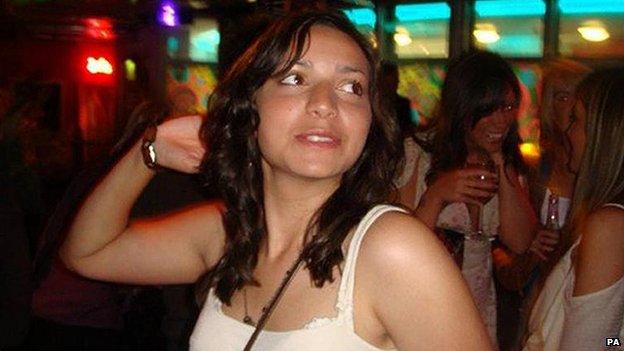Amanda Knox and Raffaele Sollecito guilty of Kercher Italy murder
- Published
The verdict is the third in the case - and may yet be appealed
A court in Italy has reinstated the guilty verdicts against Amanda Knox and Raffaele Sollecito for the murder of UK student Meredith Kercher in 2007.
American Knox - who is in the US - and her Italian ex-boyfriend Sollecito had pleaded not guilty.
She was sentenced to 28 years and six months in jail, while Sollecito received 25 years.
Miss Kercher was stabbed to death in the flat she shared in Perugia with Knox.
Speaking before the verdicts emerged, Amanda Knox said she was "a marked person"
After nearly 12 hours of deliberations on Thursday, the court in Florence reinstated the verdicts first handed down in 2009 but overturned in 2011, when the pair were freed after four years in jail.
The verdicts were delivered by presiding judge Alessando Nencini, who ordered that the passport of 29-year-old Sollecito - who was in the courtroom earlier on Thursday but left before the verdicts were delivered - should be revoked.
But he made no requests for limits on 26-year-old Knox's movements, saying she was "justifiably abroad''.
He ordered that damages should be paid by the pair to the family of Miss Kercher, whose brother Lyle and sister Stephanie were present when the verdict was read out.
Speaking soon after, Lyle Kercher said: "No matter what the verdict, it was never going to be a case of celebrating anything. That's probably the best we could have hoped for."
Extradition proceedings against Knox, who refused to return to Italy for the case, may now begin.
Both she and Sollecito can lodge appeals with the supreme court, which will have the final say. But it could take a year to make a ruling, experts say.
Sollecito was "struck dumb" after hearing the verdict on TV, his lawyer said.
Luca Maori said Sollecito looked "annihilated" by the sentence.
In a statement issued after the verdict, Knox said she was "frightened and saddened by this unjust" verdict.
She added: "Having been found innocent before, I expected better from the Italian justice system... There has always been a marked lack of evidence. My family and I have suffered greatly from this wrongful persecution. This has gotten out of hand."
She condemned what she described as "overzealous and intransigent prosecution, prejudiced and narrow-minded investigation, unwillingness to admit mistake, reliance on unreliable testimony and evidence, character assassination, inconsistent and unfounded accusatory theory, and counterproductive and coercive interrogation techniques that produce false confessions and inaccurate statements".
Stephen Vladeck, a law professor at American University in Washington, said that if Italy made a extradition request, the US would have to decide whether it fell under their extradition treaty.

Meredith Kercher was found dead in her room

Amanda Knox, her face covered, left her parents' home in Seattle after the verdict

Meredith Kercher's brother and sister, Lyle and Stephanie, were in court

Raffaele Sollecito was also in court earlier on Thursday but left before the verdicts
While there was "no reason to think the US has a specific interest" in blocking her extradition, Mr Vladeck said, countries could effectively stand in the way with a variety of "creative" interpretations of extradition treaties.
He added that if the US did grant Italy's request, Knox could fight her extradition in a US court, citing among other things international human rights law.
'Sex game'
The court heard from Knox's defence team in the morning, before the two judges and eight jurors retired to deliberate on a verdict.
Amanda Knox's friend Tom Wright: "Those around her, and Amanda herself, will not rest until she is exonerated"
Summing up, Knox's lawyer, Carlo Dalla Vedova, told the court her innocence was "rock-solid and it allows us to await the verdict with serenity".
Sollecito, 29, told the court in November that it made "no real sense" for him to have committed "such an atrocious act".
Miss Kercher, from Coulsdon in south London and 21 at the time, was found with her throat cut in a flat she shared with Knox in the college city of Perugia, in the central region of Umbria.
Rudy Guede from the Ivory Coast was convicted of her murder at an earlier trial and sentenced to 16 years in prison.
Prosecutors sought to prove Miss Kercher had died in a sex game involving Knox and Sollecito that went wrong.
They have since alleged that the murder resulted from a heated argument over cleanliness in the Perugia apartment.
Arrested days after the murder and detained in prison, Knox and Sollecito were tried and convicted in November 2009. In 2011, an eight-member jury cleared both defendants of Miss Kercher's murder after doubts were raised over procedures used to gather DNA evidence.
Ordering a retrial last year after an appeal by prosecutors, who argued that important DNA evidence had been disregarded, the supreme court in Rome moved proceedings from Umbria to Florence, in the northern region of Tuscany.
- Published27 March 2015

- Published27 March 2015

- Published28 March 2015

- Published30 January 2014
